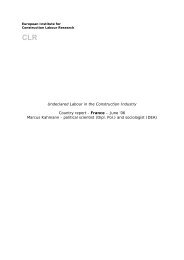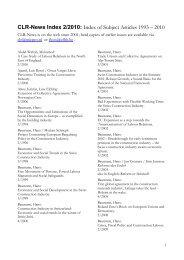Japan – what can we learn? - Construction Labour Research
Japan – what can we learn? - Construction Labour Research
Japan – what can we learn? - Construction Labour Research
You also want an ePaper? Increase the reach of your titles
YUMPU automatically turns print PDFs into web optimized ePapers that Google loves.
But asked, who decides on the wages, they ans<strong>we</strong>red, that it is theemployer who takes that decision as <strong>we</strong>ll as the decision on workingtime. The trade union officers seemed to have difficulties in workingthe question out; it seemed to be quite normal to them that wages andworking time are part of the employers’ business. Probably this isattributable to the <strong>Japan</strong>ese tradition of sharing profits and <strong>we</strong>althmore or less fairly.The most important field of activity of Zenkensoren is the pensionfunds. Most of Zenkensoren’s employees (the exact number was notknown by the trade union officers who still attended the 5.5 hourinterview <strong>–</strong> the general secretary and the chief executive officer had toleave a bit earlier <strong>–</strong> but was estimated to be some 2,000) work not as aunion officer as understood in Europe but as a manager, or serviceagentin Zenkensoren’s sister-organisation.Gender aspects are not discussed at all; there is no equal opportunitypolicy. The only reason given for this is the very low number ofwomen working on sites.But with regard to reports made by Rengo, this is not typical for anysector in <strong>Japan</strong>. In other sectors, the trade unions are involved incollective bargaining, so the question as to why the unions in theconstruction sector are so <strong>we</strong>ak remains unans<strong>we</strong>red.CLR News No 2/200617









